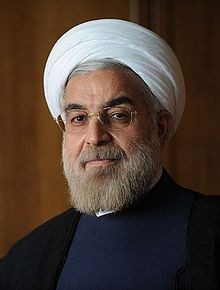
Iran divided over diplomatic efforts
By Joshua Miller
Last week, President Hassan Rouhani gave a diplomatic bid to the United Nations to mend the distrust that has existed between Iran and the United States for over thirty years, ending in a historic phone call with President Barack Obama.
A clear majority of Iran’s assembly, controlled by political factions deeply loyal to Ayatollah Ali Khamenei, reportedly endorsed Rouhani for presenting the image of a “powerful and peace-seeking Iran which seeks talk and interaction for the settlement of regional and international issues,” Fars news agency said.
 The clear support of Rouhani’s diplomatic efforts were reaffirmed when the state-controlled Islamic Republic of Iran Broadcasting (IRIB), a hardline news source, offered a radically different perspective from its previous historical actions on the presidential phone call to its viewers. In its news programming, IRIB presented in depth coverage of Rouhani returning to Iran. Despite chanting anti-Rouhani protestors, the network’s reporters walked around the streets of Iran inquiring seemingly typical Iranian citizens on their opinions of the presidential phone call with the nation that was for years past called “the Great Satan.”
The clear support of Rouhani’s diplomatic efforts were reaffirmed when the state-controlled Islamic Republic of Iran Broadcasting (IRIB), a hardline news source, offered a radically different perspective from its previous historical actions on the presidential phone call to its viewers. In its news programming, IRIB presented in depth coverage of Rouhani returning to Iran. Despite chanting anti-Rouhani protestors, the network’s reporters walked around the streets of Iran inquiring seemingly typical Iranian citizens on their opinions of the presidential phone call with the nation that was for years past called “the Great Satan.”
Every person that was interviewed and broadcasted by the IRIB network welcomed the event; one young pharmacist stated, “I could not have dreamt that the Iranian news would broadcast the voice of real people who would say, on camera, that our president has conversed with America… To see such a thing on IRIB was just as shocking as the actual news of Rouhani’s conversation with Obama.”
Contrastingly, deeply conservative factions within Iran, such as Raja News, espoused condemnatory remarks of Rouhani’s actions: “Putting aside the glaring error by the president in this attempt, and the lack of respect for the deep theoretical foundations erected by the late Imam [Ayatollah Ruhollah Khomeini] with regards to dealing with the Great Satan, this venture has no benefit for Iran in any economic or rational calculus either… This strange and doubtful behavior on part of the president has occurred in a situation where it will produce no tangible diplomatic outcome for ‘revolutionary Iran’.”
The divisive nature of politics in Iran indicates a larger tone of underlying tension than previously known. Historically conservative groups still relate to the ideological undertones of the Ayatollah Khomeini’s revolutionary era, while the majority of others – including the current Ayatollah and President Rouhani – have seemingly signified a subtle change towards mending the deeply-seeded gridlock that has characterized the Iranian-American relationship for decades.
It is hard to discern whether the recent diplomatic efforts are completely benign or if they connote a means to erect a front for more nuclear development – either way the U.S. should proceed with diplomatic efforts, but continue to do so with cautious eyes.






